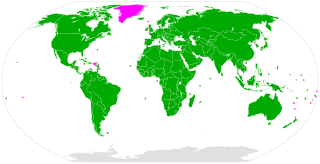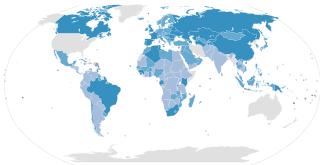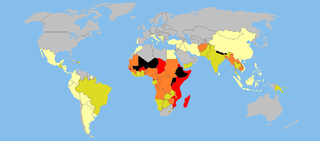
The International Labour Organization (ILO) is a United Nations agency whose mandate is to advance social and economic justice by setting international labour standards. Founded in October 1919 under the League of Nations, it is the first and oldest specialised agency of the UN. The ILO has 187 member states: 186 out of 193 UN member states plus the Cook Islands. It is headquartered in Geneva, Switzerland, with around 40 field offices around the world, and employs some 3,381 staff across 107 nations, of whom 1,698 work in technical cooperation programmes and projects.
Labour laws are those that mediate the relationship between workers, employing entities, trade unions, and the government. Collective labour law relates to the tripartite relationship between employee, employer, and union.

A work accident, workplace accident, occupational accident, or accident at work is a "discrete occurrence in the course of work" leading to physical or mental occupational injury. According to the International Labour Organization (ILO), more than 337 million accidents happen on the job each year, resulting, together with occupational diseases, in more than 2.3 million deaths annually.

The Convention Concerning the Prohibition and Immediate Action for the Elimination of the Worst Forms of Child Labour, known in short as the Worst Forms of Child Labour Convention, was adopted by the International Labour Organization (ILO) in 1999 as ILO Convention No 182. It is one of eight ILO fundamental conventions.

The ILO Convention Concerning Minimum Age for Admission to Employment C138, is a convention adopted in 1973 by the International Labour Organization. It requires ratifying states to pursue a national policy designed to ensure the effective abolition of child labour and to raise progressively the minimum age for admission to employment or work. It is one of eight ILO fundamental conventions. Convention C138 replaces several similar ILO conventions in specific fields of labour.

Trafficking of children is a form of human trafficking and is defined by the United Nations as the "recruitment, transportation, transfer, harboring, and/or receipt" kidnapping of a child for the purpose of slavery, forced labour and exploitation. This definition is substantially wider than the same document's definition of "trafficking in persons". Children may also be trafficked for the purpose of adoption.
Labour Clauses Convention, 1949 is an International Labour Organization (ILO) Convention adopted in Geneva on 29 June 1949. Its preamble states:
Having decided upon the adoption of certain proposals concerning labour clauses in public contracts ....
The Convention concerning Equal Remuneration for Men and Women Workers for Work of Equal Value, or Equal Remuneration Convention is the 100th International Labour Organization Convention and the principal one aimed at equal remuneration for work of equal value for men and women. States parties may accomplish this through legislation, introduction of a system for wage determination and/or collective bargaining agreements. It is one of 8 ILO fundamental conventions.
The Convention concerning Discrimination in Respect of Employment and Occupation or Discrimination Convention is an International Labour Organization Convention on anti-discrimination. It is one of eight ILO fundamental conventions. The convention requires states to enable legislation which prohibits all discrimination and exclusion on any basis including of race or colour, sex, religion, political opinion, national or social origin in employment and repeal legislation that is not based on equal opportunities.
Home Work Convention, created in 1996, is an International Labour Organization (ILO) Convention, which came into force in 2000. It offers protection to workers who are employed in their own homes.

A significant proportion of children in India are engaged in child labour. In 2011, the national census of India found that the total number of child labourers, aged [5–14], to be at 10.12 million, out of the total of 259.64 million children in that age group. The child labour problem is not unique to India; worldwide, about 217 million children work, many full-time.

The Maritime Labour Convention (MLC) is an International Labour Organization (ILO) convention, number 186, established in 2006 as the fourth pillar of international maritime law and embodies "all up-to-date standards of existing international maritime labour Conventions and Recommendations, as well as the fundamental principles to be found in other international labour Conventions". The other pillars are the SOLAS, STCW and MARPOL. The treaties applies to all ships entering the harbours of parties to the treaty, as well as to all ships flying the flag of state party.
The Conventions concerning Employment of Women during the Night are conventions drafted by the International Labour Organization (ILO) which prohibit women from performing industrial work during the night. The first convention was adopted in 1919 and revised versions were adopted in 1934 and 1948. A protocol to the convention was adopted in 1990 allowing for easing of the restriction under conditions. As of April 2011 the conventions had 27, 15, 46 (undenounced) ratifications respectively. The protocol was ratified 5 and denounced by 2.

The Convention on Domestic Workers, formally the Convention concerning Decent Work for Domestic Workers is a convention setting labour standards for domestic workers. It is the 189th ILO convention and was adopted during the 100th session of the International Labour Organization, in 16 June 2011. It entered into force on 5 September 2013.
International labour law is the body of rules spanning public and private international law which concern the rights and duties of employees, employers, trade unions and governments in regulating Work and the workplace. The International Labour Organization and the World Trade Organization have been the main international bodies involved in reforming labour markets. The International Monetary Fund and the World Bank have indirectly driven changes in labour policy by demanding structural adjustment conditions for receiving loans or grants. Issues regarding Conflict of laws arise, determined by national courts, when people work in more than one country, and supra-national bodies, particularly in the law of the European Union, has a growing body of rules regarding labour rights.
The First International Congress of Working Women (ICWW), convened by the Women's Trade Union League of America from October 28 to November 6, 1919, was a meeting of labor feminists from around the world. The ICWW planned to share their proposals for addressing women's labor concerns at the First International Labor Conference (ILC) of 1919. ICWW delegates agreed upon a list of resolutions, some of which were taken up by the ILC's Commission on the Employment of Women and resulted in the passage of the Maternity Protection Convention, 1919.
The gender pay gap in New Zealand is the difference in the median hourly wages of men and women in New Zealand.In 2020 the gender pay gap is 9.5 percent. It is an economic indicator used to measure pay equality. The gender pay gap is an official statistic published annually by Stats NZ sourced from the Household Labour Force Survey.
Child labour laws are statutes placing restrictions and regulations on the work of minors.
The International Domestic Workers Federation is the first membership-based global organization of household and domestic workers. The IDWF has 81 affiliates in 63 countries, representing over 590,000 members.








